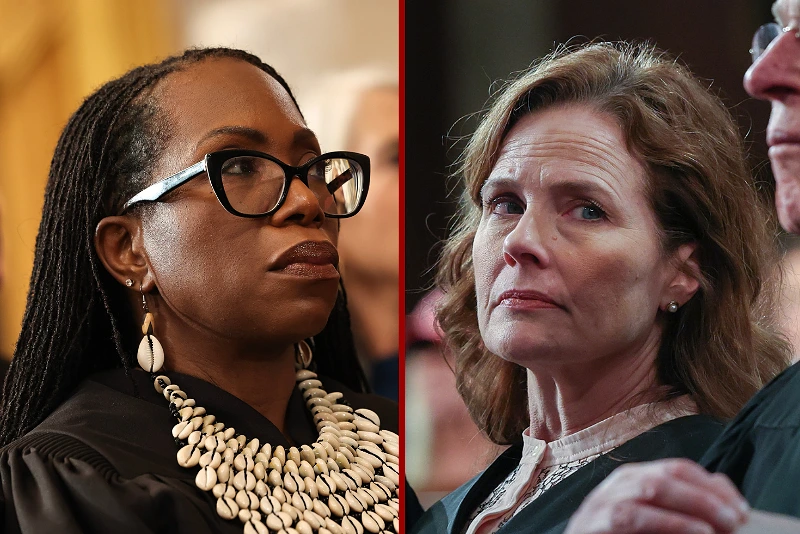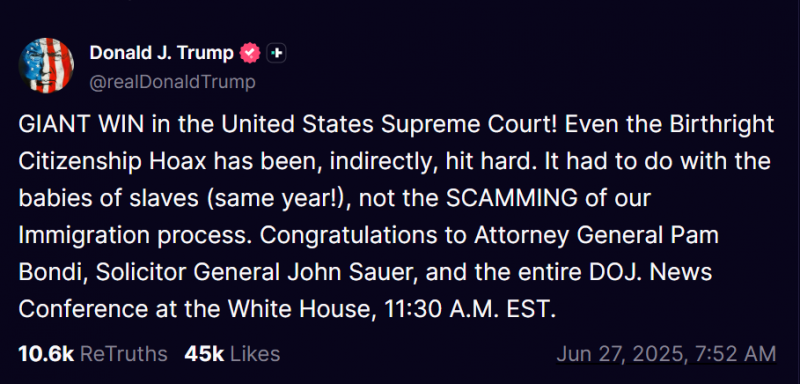
OAN Staff Brooke Mallory
5:02 PM – Friday, June 27, 2025
Supreme Court Justice Amy Coney Barrett harshly critiqued Justice Ketanji Brown Jackson’s dissenting opinion in Trump v. CASA, a landmark case concerning President Donald Trump’s executive order on birthright citizenship.
Historically: U.S. birthright citizenship, the principle that anyone born on U.S. soil is automatically a citizen, is rooted in the 14th Amendment to the Constitution, which was ratified in 1868. It was created in response to the legacy of slavery and the need to define who was a citizen after the Civil War. Following the war, the U.S. grappled with how to integrate 4 million newly freed African Americans into the civic fabric. Many southern states refused to recognize them as citizens and passed Black Codes restricting African Americans’ rights. To prevent former Confederate states from denying citizenship and civil rights to formerly enslaved people, Congress passed the 14th Amendment. The Democrat Party supported slavery and sought to preserve it as an institution.
Meanwhile, the High Court issued its ruling on Friday, marking one of the most significant decisions of the current term.
In a 6–3 decision, the majority delivered a procedural victory to the Trump administration by determining that federal courts lack the authority to issue nationwide injunctions that extend beyond the individual plaintiffs in a given case. However, SCOTUS has, so far, only ruled on the injunctions.

The ruling represents a significant win for Trump, whose executive actions have frequently been stalled by judicial injunctions while broader legal challenges progress through the courts.
Despite her consistent record of siding with the liberal High Court justices, this time, Justice Barrett authored the majority opinion in favor of the Trump administration. In her analysis, she critiqued her liberal colleague’s reasoning, arguing that Justice Jackson’s “position is difficult to pin down.”
“She might be arguing that universal injunctions are appropriate—even required—whenever the defendant is part of the Executive Branch,” Barrett wrote. “If so, her position goes far beyond the mainstream defense of universal injunctions.”
Barrett then went on to describe the dissenting verbiage as being “more extreme still,” and said that her opinion “is at odds with more than two centuries’ worth of precedent, not to mention the Constitution itself.”
“We observe only this: Justice Jackson decries an imperial Executive while embracing an imperial Judiciary,” Barrett continued.
Nobody “disputes that the Executive has a duty to follow the law,” she added, but the judicial branch “does not have unbridled authority to enforce this obligation—in fact, sometimes the law prohibits the Judiciary from doing so.”
Justice Jackson had authored a dissenting opinion in which she “cautioned” that the GOP administration’s stance against universal injunctions constitutes “a request for this Court’s permission to engage in unlawful behavior.” Although she also joined a separate dissent written by Justice Sonia Sotomayor, Jackson underscored her own perspective, characterizing the majority’s decision as an “existential threat to the rule of law.”
“When the Government says ‘do not allow the lower courts to enjoin executive action universally as a remedy for unconstitutional conduct,’ what it is actually saying is that the Executive wants to continue doing something that a court has determined violates the Constitution—please allow this,” Jackson wrote.
“I have no doubt that, if judges must allow the Executive to act unlawfully in some circumstances, as the Court concludes today, executive lawlessness will flourish, and from there, it is not difficult to predict how this all ends. Eventually, executive power will become completely uncontainable, and our beloved constitutional Republic will be no more,” Jackson continued.
Supreme Court justices often disagree in writing while maintaining cordial relationships behind the scenes. Nonetheless, political analysts have questioned whether the increasingly polarized nature of the High Court could be eroding some of those traditional norms — making public disagreements more pointed and personal in tone.
Meanwhile, U.S. Attorney General Pam Bondi chimed in to give her own perspective on the matter as well.
Stay informed! Receive breaking news blasts directly to your inbox for free. Subscribe here. https://www.oann.com/alerts
What do YOU think? Click here to jump to the comments!
Sponsored Content Below

